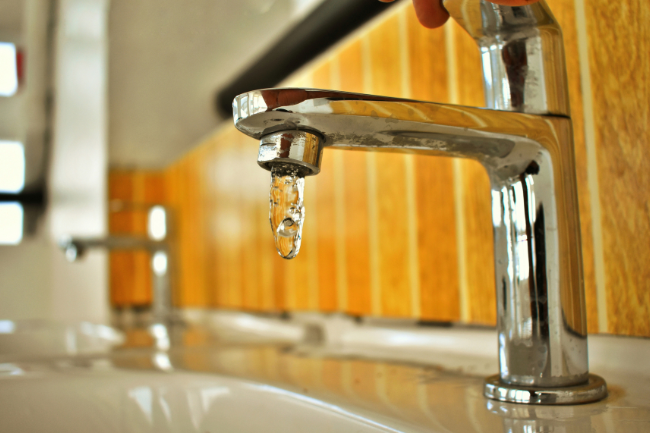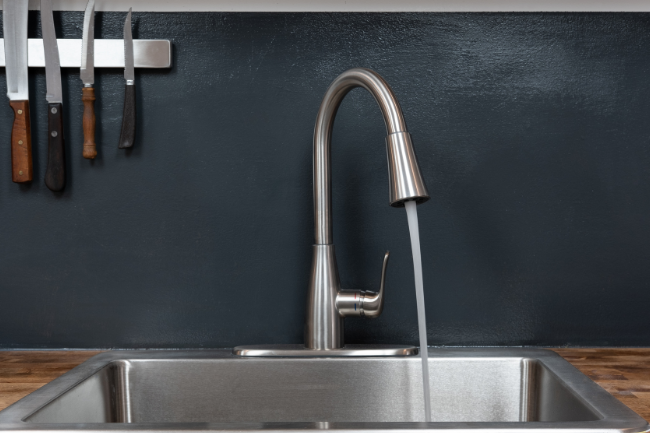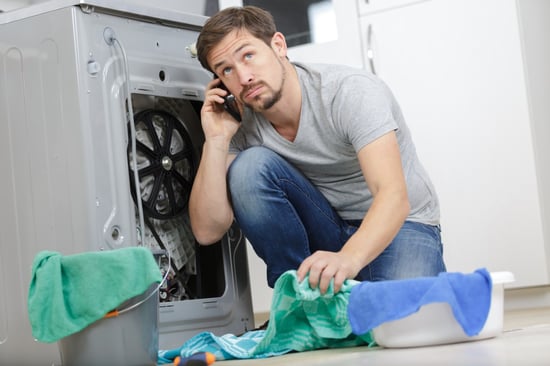Can Copper Piping Cause Plumbing Problems? 7 Signs of Trouble
Posted by Express Sewer & Drain Team on
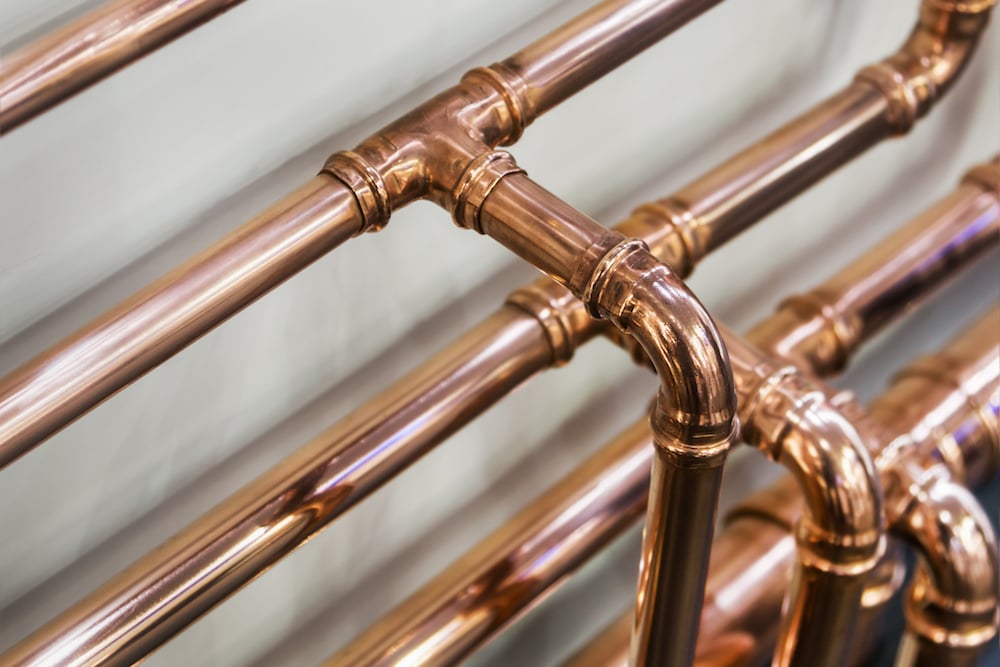
Copper piping has been a popular choice for homes and commercial buildings since the 1960s. While it does have its advantages, copper piping plumbing also has a fair number of disadvantages – especially if it begins to corrode, as was the case in Folsom, CA in 2020 (more on this later). In this blog, we’ll discuss the good and the bad when it comes to copper piping, and what to look for if you suspect a problem with your copper piping.
Copper Piping Pros & Cons
Here’s a look at the advantages and disadvantages of using copper piping for plumbing in homes and commercial buildings.
Copper Piping Pros
- Easy installation. Copper piping is lightweight and durable, so it’s easy to transport, carry, and install. While this is more of a benefit for plumbers, the ease of installation does mean the job may be completed quicker.
- Flexibility. Copper piping’s flexibility makes it less likely to rupture during a quake. And, since California is one of the most earthquake-prone states in the country, this is a big benefit.
- High corrosion-resistance. Compared to steel, copper piping doesn’t rust and can maintain a nice shine for decades.
- Long-lasting. How long does copper piping last? Good quality copper piping can last more than 50 years (lesser quality piping will shorten the copper piping lifespan, however).
- Bacteria-resistant. Unlike steel and PVC, copper is antimicrobial and can kill 99.9% of microorganisms within two hours of contact.
- Eco-friendly. Unlike most plastic piping, such as polyvinyl chloride (PVC) or cross-linked polyethylene (PEX), the manufacturing process for copper plumbing pipes is environmentally friendly. Copper releases less dangerous emissions and chemicals into the environment and are recyclable at the end of their lifespan.
Copper Piping Cons
- Varying quality. As mentioned above, there are high- and low-quality coppers. Since the 2000s, some builders have begun using sub-par copper piping to try to save money, making it more likely to develop problems down the road.
- Water sensitivity. Although it is highly resistant to corrosion, copper pipes can react to water with high acidity, causing corrosion and deterioration to the interior of the pipes. This can give your water an unpleasant taste and lead to pinhole leaks.
- Pressure-sensitivity. Copper piping can become physically damaged when using high water pressure.
- Pricey. The cost of copper piping is more expensive than plastic piping, such as PVC and PEX piping (one reason they are gaining in popularity).
- Potentially hazardous. Is copper piping safe for drinking water? Yes – however, if it does begin to corrode due to a water reaction, copper can be released into the water. According to Texas A&M AgriLife Extension, even though we require 1,000 micrograms of copper daily in our diet, elevated levels of ingested copper can be harmful, causing permanent kidney and liver damage in infants under the age of 1 year and digestive disorders in adults.
- Electrolysis reactive. Electrolysis can occur when a direct current electrical leak takes place underground. This type of leak is prone to attacking copper pipes, causing corrosion that can lead to pinhole leaks or elevated copper levels in water.
Copper Piping Warning Signs
Is there a problem with your copper piping? Thankfully, issues don’t have to go unnoticed as there are some telltale signs that indicate a copper piping plumbing problem.
- Sudden low water pressure. Witnessing a sudden loss in water pressure? You could have a leak due to copper piping corrosion (check out other causes of low water pressure here).
- Soggy carpets or ceiling stains. These are other indicators of a leak, potentially due to a corroded copper pipe. Shut off the water if possible, and call a plumber to assess the situation.
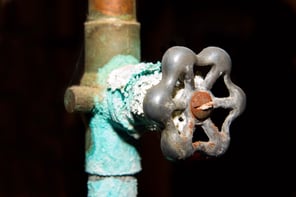 Teal stains. Iron turns rusty when it oxidizes; copper turns teal. Stains that are teal (a bluish-green color) on your shower or bathtub may not be mold, but rather copper piping corrosion (you may also see this on exposed pipes). Fun fact: The Statue of Liberty, made of copper and iron, used to be brown; oxidation caused her to become teal over time.
Teal stains. Iron turns rusty when it oxidizes; copper turns teal. Stains that are teal (a bluish-green color) on your shower or bathtub may not be mold, but rather copper piping corrosion (you may also see this on exposed pipes). Fun fact: The Statue of Liberty, made of copper and iron, used to be brown; oxidation caused her to become teal over time.- Water stagnation. If you’ve left the water off in your home for some time, or you have a faucet that gets little use (say, one in a little-used bathroom), stagnant water sitting will sit in your pipes and will more actively corrode the interior of the pipe than if it were moving regularly. So, consider shutting off the water and drain your pipes before leaving on your next vacation!
- Discolored water. You may notice discolored water coming from the faucet which is a common indicator of copper piping corrosion. Most commonly, you’ll see this in the “first draw of the day” as that is the water that has sat in your pipes overnight.
- Metallic taste. Corroded copper pipes create a metallic taste. Cold first-draw water that is bitter but goes away later in the day also indicates pipe corrosion.
- Frequent clogs. Pipes that clog easily can be an indicator of corrosion, as oxidation and mineral deposits can build up on the inside of pipes, making them narrower.
These signs don’t automatically mean your copper pipes are failing as other culprits may be to blame. The best way to determine if your copper piping is failing is to call a knowledgeable and professional plumber.
Concerned About Copper Piping? Call the Experts at Express Sewer & Drain
It began in the summer of 2020: Pinhole leaks in copper piping across numerous residents in Folsom, CA, in Sacramento County. As of 2021, a class action lawsuit in Folsom has been centered around copper piping, with more than 2,300 reports of pinhole leaks from residents. The lawsuit suggests that water in the area – containing high pH levels and chlorine residual – caused the copper piping corrosion which led to the leaks and that the city is to blame.
Whether you’re in Folsom or anywhere else in the Sacramento area, Express Sewer & Drain is here for you. If you suspect a copper piping problem, our trained experts can come out to your home or business to assess the situation and offer solutions, whether discussing how to replace copper piping or offering an alternative to copper piping. Call us today for your inspection.
Topics: Pipe Leaks and Repair

